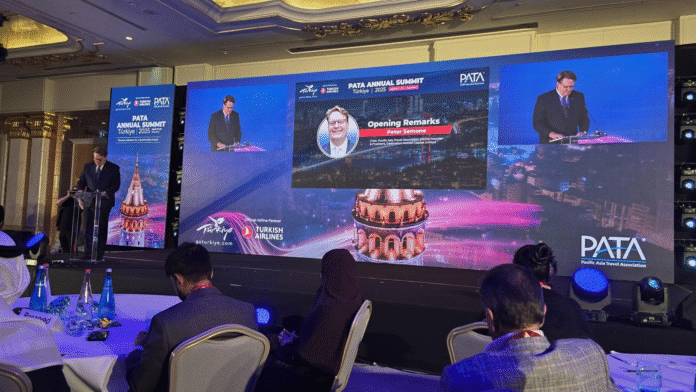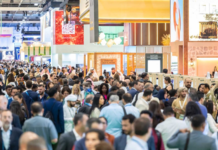In a powerful and visionary keynote that set the tone for the 2025 Pacific Asia Travel Association (PATA) Annual Summit, Chair Peter Semone called for a fundamental transformation in the way the global tourism industry defines success. Speaking to a distinguished audience of over 260 delegates from 35 countries gathered in Istanbul, Türkiye, Semone placed “meaningful tourism” at the heart of his address—an urgent, values-driven approach aimed at recalibrating the industry’s priorities for a sustainable and equitable future.
Themed “Timeless Wisdom for a Sustainable Future,” the summit brought together a broad cross-section of the travel sector—including government ministers, industry leaders, academics, and members of the press—for high-level dialogue and cultural exchange. Co-hosted by Türkiye’s Tourism Promotion and Development Agency (TGA) and Turkish Airlines, the event reflected both the diversity and dynamism of the Asia-Pacific region while spotlighting its critical role in shaping the future of global tourism.
A Call to Rethink the Metrics of Success
In his keynote speech, Semone did not shy away from challenging long-standing conventions. He critiqued the industry’s reliance on legacy indicators such as visitor numbers, length of stay, and daily spend, branding them as artifacts of a bygone era. “These are the metrics of the 1970s,” he declared. “They no longer capture the full picture of what tourism should strive to achieve.”
Instead, Semone advocated for a broader, deeper set of performance indicators—ones that measure the quality of life for host communities, the protection of cultural heritage, and the integrity of the natural environment. “Let livability be our compass,” he urged. “We must build destinations where residents flourish and where travelers engage in truly authentic, enriching experiences.”
This philosophical shift underpins PATA’s newly ratified organizational vision: to realize a meaningful Pacific Asia tourism economy. The updated mission outlines a strategic pivot toward innovation, community impact, and sustainability—replacing growth-at-all-costs models with a more holistic framework for tourism development.
Grounded in Action: New Initiatives Unveiled
Semone’s address was not just aspirational; it came with a roadmap. Among the summit’s most anticipated announcements were several key initiatives designed to operationalize the concept of meaningful tourism:
- The PATA Index: A comprehensive, data-driven benchmarking system that goes beyond quantitative metrics to evaluate tourism’s full spectrum of impact—social, environmental, cultural, and economic.
- Ask a PATA Expert Program: A first-of-its-kind initiative offering one-on-one expert consultations on sustainability, workforce development, and destination stewardship during the summit.
- New Research Report: The Evolving Tourism Workforce: Human Capital Development in APAC, a major research release scheduled during the summit, delves into trends in labor, skills development, and talent mobility in the region.
These programs signal PATA’s commitment to moving beyond rhetoric and into implementation—fostering resilience and equity at every level of the tourism value chain.
A Sector at a Crossroads
Framing his remarks within the broader global context, Semone acknowledged the formidable challenges currently facing the travel industry: climate change, technological disruption, economic volatility, and rising geopolitical tensions. He warned that public perception of tourism is shifting—from a symbol of opportunity to a source of contention.
“Tourism, once venerated as a development engine, is now often viewed as a problem,” he said, pointing to issues such as overtourism, cultural commodification, and resident displacement. “To reclaim its potential, we must rethink our purpose.”
Yet Semone remained optimistic. He emphasized the Asia-Pacific region’s unique advantages—its cultural diversity, resilience, and collaborative ethos—as building blocks for a more ethical, inclusive, and future-ready tourism model.
Looking Ahead: 75 Years of PATA
In a press conference following his keynote, Semone unveiled plans for PATA’s 75th anniversary celebration in 2026. The Diamond Jubilee Summit will take place in South Korea’s Gyeongsangbuk-do province, spanning the historic cities of Gyeongju and Pohang. This marks PATA’s return to a region it last visited in 1979, symbolizing both continuity and transformation.
“This will be more than an anniversary,” Semone noted. “It will be a moment of reflection and renewal—an opportunity to galvanize our community around a shared vision of meaningful tourism.”
The Chair also emphasized the importance of local partnerships in defining and advancing this vision. “This is not about mandates from the top,” he said. “It’s about building a shared understanding and empowering collective action at every level.”
Walking the Talk on Sustainability
True to its message, the 2025 summit was designed with sustainability at its core. In collaboration with local partners, PATA implemented meaningful carbon offset initiatives—including support for the Kınık Wind Power Plant in İzmir. These efforts underscore the association’s role as a responsible industry leader in the face of climate imperatives.
Tourism as a Force for Good
Throughout the summit, cultural programming offered a reminder of tourism’s unique power to foster empathy and connection. Delegates participated in Turkish coffee workshops, learned the traditional art of Ebru marbling, and contributed books to the Rami Library—small but symbolic gestures that underscored Semone’s larger message.
“Tourism is about people. It’s about stories, exchange, and mutual respect,” he reflected. “We’re not just managing an association—we’re nurturing a movement. And when done right, tourism remains one of the world’s greatest forces for good.”
A Defining Moment for Tourism
As the 2025 PATA Annual Summit concludes, it leaves in its wake a renewed sense of purpose and possibility. The call for meaningful tourism represents more than a strategic shift—it is a redefinition of tourism’s very soul.
In Semone’s words, it’s time for the industry to “be more reflective, more inclusive, and more future-focused.” As destinations worldwide seek to rebuild and reinvent, PATA’s message resonates far beyond the Asia-Pacific: tourism’s future lies not in the numbers, but in its values.











